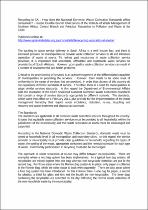 ResearchSpace
ResearchSpace
Recycling in SA – How does the National Domestic Waste Collection Standards affect consumers?
JavaScript is disabled for your browser. Some features of this site may not work without it.
- ResearchSpace
- →
- Research Publications/Outputs
- →
- Journal Articles
- →
- View Item
| dc.contributor.author |
Oelofse, Suzanna HH

|
|
| dc.date.accessioned | 2012-01-20T09:36:52Z | |
| dc.date.available | 2012-01-20T09:36:52Z | |
| dc.date.issued | 2011-10 | |
| dc.identifier.citation | Oelofse, S.H.H. 2011. Recycling in SA – How does the National Domestic Waste Collection Standards affect consumers?. Green Industries (2011) | en_US |
| dc.identifier.uri | http://www.greenindustries.org.za/articles/article/recycling-separation-at-source/ | |
| dc.identifier.uri | http://hdl.handle.net/10204/5523 | |
| dc.description | Copyright: 2011 Green Industries | en_US |
| dc.description.abstract | The backlog in waste service delivery in South Africa is a well known fact, and there is increased pressure on municipalities to provide waste collection services to all and introduce seperation of waste at source. To redress past imbalances in waste collection service provision, it is imperative that acceptable, affordable and sustainable waste services be provided to all South Africans. However, poor quality waste collection services can result in a number of environmental and health problems. Critical to the provisioning of services is an acknowledgement of the differentiated capacities of municipalities in providing the services. However, there needs to be some level of uniformity in the range of services that are provided, in order that citizens of this country do not experience different standards of service. Therefore, there is a need for municipalities to adopt similar services standards. In this regard the Department of Environmental Affairs with the assistance of the CSIR developed National Domestic Waste Collection Standards that contain a range of service standards appropriate to different contexts. The standards, which came into effect on 1 February 2011, also provide for the implementation of the waste management hierarchy that require waste avoidance, reduction, re-use, recycling and recovery and waste treatment and disposal as last resort. | en_US |
| dc.language.iso | en | en_US |
| dc.publisher | Green Industries | en_US |
| dc.relation.ispartofseries | Workflow request;7835 | |
| dc.subject | Waste services | en_US |
| dc.subject | Waste service delivery | en_US |
| dc.subject | Waste collection standards | en_US |
| dc.subject | South African waste standards | en_US |
| dc.subject | Waste disposal | en_US |
| dc.subject | Waste treatment | en_US |
| dc.title | Recycling in SA – How does the National Domestic Waste Collection Standards affect consumers? | en_US |
| dc.type | Article | en_US |
| dc.identifier.apacitation | Oelofse, S. H. (2011). Recycling in SA – How does the National Domestic Waste Collection Standards affect consumers?. http://hdl.handle.net/10204/5523 | en_ZA |
| dc.identifier.chicagocitation | Oelofse, Suzanna HH "Recycling in SA – How does the National Domestic Waste Collection Standards affect consumers?." (2011) http://hdl.handle.net/10204/5523 | en_ZA |
| dc.identifier.vancouvercitation | Oelofse SH. Recycling in SA – How does the National Domestic Waste Collection Standards affect consumers?. 2011; http://hdl.handle.net/10204/5523. | en_ZA |
| dc.identifier.ris | TY - Article AU - Oelofse, Suzanna HH AB - The backlog in waste service delivery in South Africa is a well known fact, and there is increased pressure on municipalities to provide waste collection services to all and introduce seperation of waste at source. To redress past imbalances in waste collection service provision, it is imperative that acceptable, affordable and sustainable waste services be provided to all South Africans. However, poor quality waste collection services can result in a number of environmental and health problems. Critical to the provisioning of services is an acknowledgement of the differentiated capacities of municipalities in providing the services. However, there needs to be some level of uniformity in the range of services that are provided, in order that citizens of this country do not experience different standards of service. Therefore, there is a need for municipalities to adopt similar services standards. In this regard the Department of Environmental Affairs with the assistance of the CSIR developed National Domestic Waste Collection Standards that contain a range of service standards appropriate to different contexts. The standards, which came into effect on 1 February 2011, also provide for the implementation of the waste management hierarchy that require waste avoidance, reduction, re-use, recycling and recovery and waste treatment and disposal as last resort. DA - 2011-10 DB - ResearchSpace DP - CSIR KW - Waste services KW - Waste service delivery KW - Waste collection standards KW - South African waste standards KW - Waste disposal KW - Waste treatment LK - https://researchspace.csir.co.za PY - 2011 T1 - Recycling in SA – How does the National Domestic Waste Collection Standards affect consumers? TI - Recycling in SA – How does the National Domestic Waste Collection Standards affect consumers? UR - http://hdl.handle.net/10204/5523 ER - | en_ZA |





